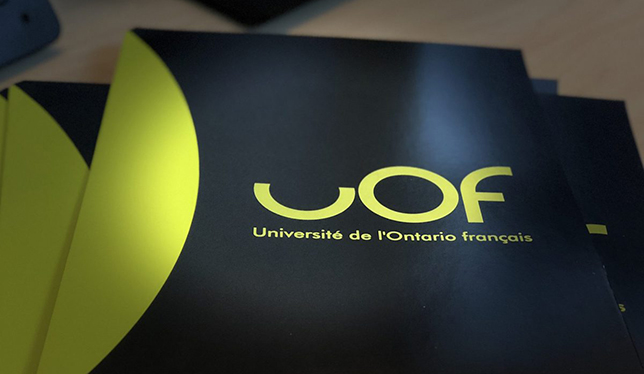Ontario’s French-language universities want a network of their own
Collaboration and improved program offerings are at the heart of this proposed initiative, which draws inspiration from the Université du Québec network.

This past spring, a report was delivered to elected Ontario and federal officials touting the benefits of an official network for the province’s francophone universities. The founding institutions of the proposed Réseau des universités francophones de l’Ontario (RUFO) would include the fledgling Université de l’Ontario français (UOF) and Université de Hearst, which gained full independence from Laurentian University this year. A spot in RUFO would also be reserved for the University of Sudbury if it manages to get the funding to reopen its doors.
The network’s objectives are clearly stated in the introduction of the report, which the president of UOF, Pierre Ouellette, shared with University Affairs. The project is presented as a framework for cohesion, consultation, pooling of resources, sharing and development between the institutions.
“We are two small universities…. Some basic services could be shared: group purchases, library development, student services,” Mr. Ouellette said. Together, the two universities currently offer about 10 academic programs.
“We see the future of the University of Sudbury as part of a network of French-language universities in Ontario. This is what the community wants. It makes sense in terms of programs, student services and administrative services. This will allow us to focus our resources on what really matters,” said U of Sudbury president Serge Miville.
According to U de Hearst president Luc Bussières, the idea is not new. “I’ve been in office since 2017, and already I was having these discussions with Dyane Adam, who was chair of the board of governors [that created UOF].”
The report and the presidents of the two founding institutions emphasize the importance of governance “by and for” francophones in the network. They point out in the report that the history of French-language university education in Ontario shows that “the governance of bilingual, federated or affiliated institutions is difficult.”
This distinction from their English-language counterparts fits well with the criteria for institutions to apply for a share of the $121.3 million in funding that the Government of Canada set aside in 2021 to support French-language postsecondary education in Canada.
It is important to note that the report does not contain any specific funding requests, as it is primarily a presentation of the basic concept and structure. Under the proposal, the network would be funded by various levels of government as well as by members.
While they have not yet received confirmation or approval, the university presidents shared that initial feedback from federal and provincial elected officials has been positive.
Objectives and benefits
Mr. Ouellette said the idea of saving money through the network is secondary. The primary goal is “to optimize what we do so that we can do more, because we are small.”
RUFO would have a number of advantages in terms of program delivery. First and foremost, members could talk to each other during the early stages of program development to avoid stepping on each other’s toes, said the UOF president. “Our community is too small. Our resources are limited. We can’t afford to do that.”
“We – the three presidents – had very frank discussions about this,” added Dr. Bussières. “It’s important to establish a core focus at each of our institutions that will allow us to thrive and to play our part in our region.”
The network could also be a way to broaden program offerings at each of the member institutions, or even create joint programs.
But Mr. Ouellette is adamant that the network will not be used to create programs in Toronto to be delivered online in northern Ontario. “It’s doable of course, but the network is not built on that premise.”
The report also suggests that RUFO would communicate with the government on behalf of its members. Mr. Ouellette explained that RUFO would not replace the French-language universities’ advocacy efforts, but would be an additional voice on certain topics.
Inspirations and adaptations
In order to come up with the idea of RUFO, university networks (some centralized and some less so) were studied, including Université du Québec (UQ) and the State University of New York. These two networks have one thing in common: their creation was enacted by law. This is a situation RUFO wants to avoid.
The Ontario network’s structure would lie somewhere between these two models, although the report cites UQ more extensively. The universities would be equal partners and would retain their autonomy of management, governance, academics, administration and finance. “We’ve developed expertise in serving our region. That’s essential for us, and local governance, local decision-making, is very important,” said Dr. Bussières.
RUFO would have its own governance committee chaired by the presidents on an alternating basis, and with a central office to coordinate the network’s activities. The universities would collaborate on teaching, research, recruitment and marketing, student experience, internationalization, community engagement, and physical and financial resources.
The interim president of UQ, Johanne Jean, is flattered that the network was an inspiration. She sees many advantages specific to UQ that could be beneficial to a French-language network in Ontario, such as comparable data collection, consolidated purchasing and research management.
One of the prerequisites, in her opinion, is that each member must trust the network and the other members. The three Ontario presidents know each other very well; Mr. Ouellette was president of U de Hearst before Dr. Bussières. The three speak on a regular basis.
Ms. Jean also recommends patience. “Collaboration takes time. You should never take colleagues for granted.” Collaboration must go beyond the administrative level to be sustainable; it must also happen at the faculty level, she pointed out.
Ms. Jean foresees that RUFO will have one less challenge than UQ: since all its universities will be roughly the same size, there will be no larger institution dominating the network.
Only time will tell if RUFO will have the opportunity to create the same impact as UQ has had on the regions where it’s present. “No project can take place in a region like Abitibi-Témiscamingue without the university being involved in one way or another,” said Ms. Jean, who has served as president of Université du Québec en Abitibi-Témiscamingue. “In some regions, the UQ network has doubled the level of education over the last 40 to 45 years.”
Bilingual universities and colleges: not entirely excluded
To avoid submerging francophones in a sea of English, only universities governed “by and for” francophones can be full members of the RUFO network. However, a door remains open for bilingual universities, universities with a francophone component, and French-language colleges such as La Cité and Boréal.
These institutions could, in a second phase, become associate members. “We must recognize that bilingual universities and even English-language universities are doing work that is beneficial for the francophone community,” Mr. Ouellette stressed. The concept of associate members becomes relevant in terms of collaboration for services or research.
Before that happens, however, the network will have to stand on its own. “We need to lay the groundwork for a new governance model for the network, give it the means to develop and have it taken seriously, both by the bilingual universities and by the federal and provincial governments,” said Dr. Bussières.
Featured Jobs
- Canada Excellence Research Chair in Computational Social Science, AI, and Democracy (Associate or Full Professor)McGill University
- Psychology - Assistant Professor (Speech-Language Pathology)University of Victoria
- Business – Lecturer or Assistant Professor, 2-year term (Strategic Management) McMaster University
- Education - (2) Assistant or Associate Professors, Teaching Scholars (Educational Leadership)Western University
- Veterinary Medicine - Faculty Position (Large Animal Internal Medicine) University of Saskatchewan















Post a comment
University Affairs moderates all comments according to the following guidelines. If approved, comments generally appear within one business day. We may republish particularly insightful remarks in our print edition or elsewhere.